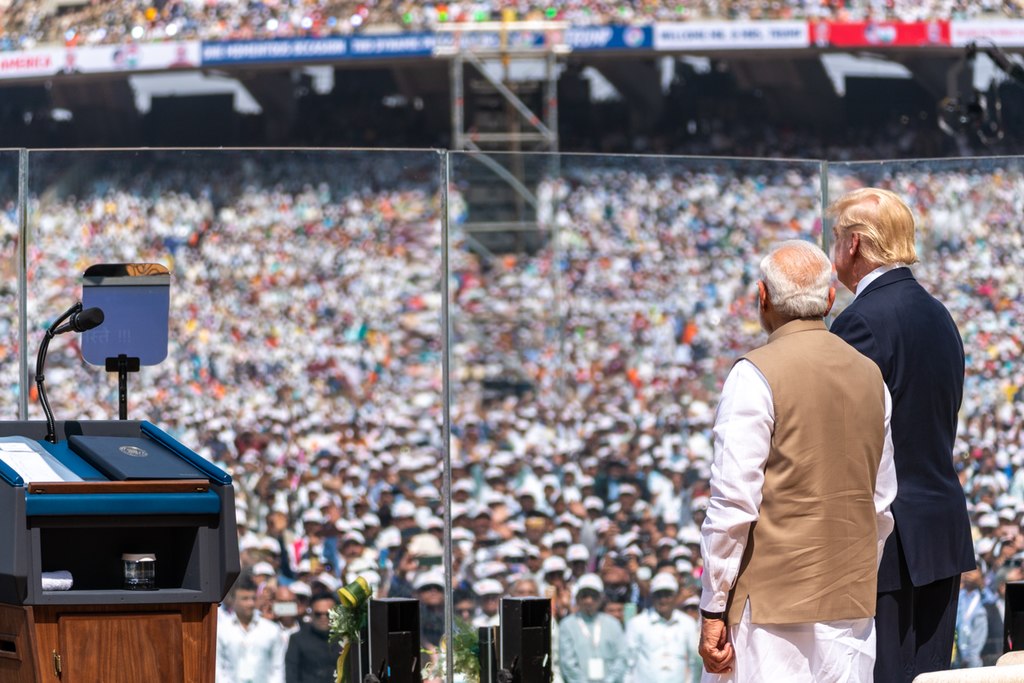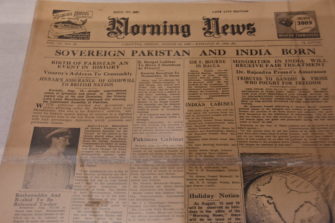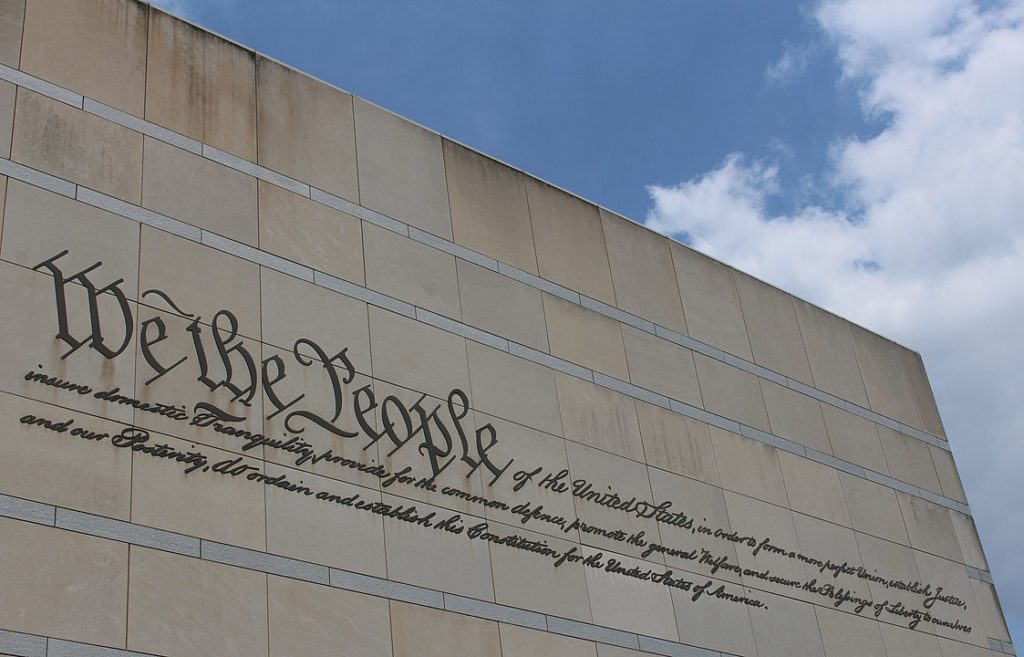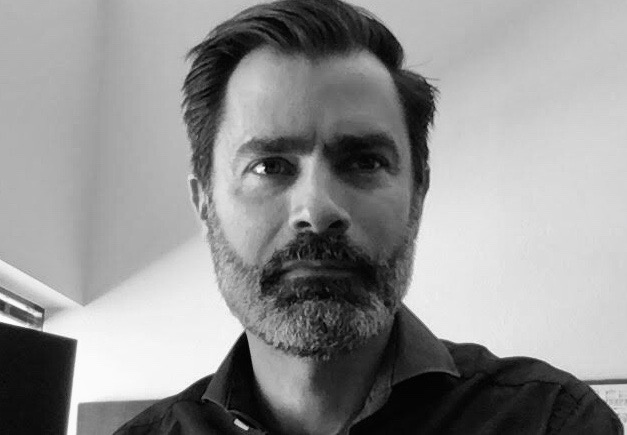
Following a massive rally with India’s prime minister, Narendra Modi, in Gujarat last month, Donald Trump tweeted a message of international comity. “Our two national constitutions begin with the same three beautiful words: ‘We the people.’ That means,” he wrote, “that in America and India alike, we honor, respect, trust, empower, and fight for the citizens we proudly serve!”
Hours earlier, three people—a police officer and two Muslim civilians—had been killed in Delhi in protests over India’s new Citizenship Amendment Act, which excludes Muslim migrants from amnesty. At least 51 people have now been killed, three-quarters of whom were Muslim, and the Delhi police have been implicated in the violence.
During his 2016 presidential campaign, Trump had promoted a ban on Muslim immigrants to the United States and a wall along its southern border with Mexico, and his term in office has been marked by anti-immigrant and anti-Muslim rhetoric.
The U.S. president’s reference to the respective preambles to the U.S. Constitution and the Constitution of India resonates with a core principle of modern democracy, the doctrine of popular sovereignty. Governments—the American Declaration of Independence declares—derive “their just powers from the consent of the governed.”
In its insistence that power belongs to the people, popular sovereignty is a liberal, potentially emancipatory, ideal. But it has repeatedly been invoked historically to oppress and exclude. Speaking in Minnesota recently, Trump sought to rouse anti-immigrant sentiment against the “large numbers of refugees to your state from Somalia” by appealing to popular sovereignty: “You should be able to decide what is best for your own cities and for your own neighborhoods and that’s what you have the right to do right now,” he told his supporters. Ostensibly a secular republic, India has recently invoked the doctrine on behalf of laws widely viewed as discriminatory toward Muslims.
This ambivalence points to a perennial question at the heart of democratic citizenship. Who are “we the people?” What makes this question puzzling is that it cannot, without circularity, be answered democratically, by appealing to the will of the people.
While the doctrine of popular sovereignty presupposes the existence of a “people”—or demos—to which government is answerable, “peoples” are not naturally occurring, well-bounded units. The respective histories of the United States and India suggest a more complicated picture: the state helps to create and maintain, through force, the people from which it claims to derive its authority.
Following independence from British colonial rule and the trauma of partition from Pakistan along a line carved by the British, which resulted in countless deaths and ongoing population transfers on a scale of approximately 14.5 million, the contemporary nation of India came into existence along with Pakistan at midnight of August 14–15, 1947. In his novel Midnight’s Children, Salman Rushdie recalls the anticipation as the clock counted down:
[T]here was an extra festival on the calendar, a new myth to celebrate, because a nation which had never previously existed was about to win its freedom, catapulting us into a world which, although it had five thousand years of history, although it had invented the game of chess and traded with Middle Kingdom Egypt, was nevertheless quite imaginary; into a mythical land, a country which would never exist except by the efforts of a phenomenal collective will—except in a dream we all agreed to dream; it was a massive fantasy . . . and would periodically need the sanctification and renewal which can only be provide by rituals of blood. (112)

One hundred seventy-one years earlier, the United States had similarly imagined itself into existence by force of will. As Jacques Derrida has noted with respect to the Declaration of Independence, “this people does not exist. They do not exist as an entity, it does not exist, before this declaration, not as such. If it gives birth to itself, as free and independent subject, as possible signer, this can hold only in the act of the signature. The signature invents the signer” (10). By speaking in the name of a nation yet to exist, the signers invented the sovereign “people” they claimed to represent, and from whom they purported to draw their authority.
The American Revolution was not, like India’s independence struggle, a de-colonial movement but a settler-colonial revolt, which drew upon colonial tropes to imagine a “good people,” oppressed from above by the British crown and harried from below by what the Declaration of Independence calls “merciless Indian Savages, whose known rule of warfare, is an undistinguished destruction of all ages, sexes and conditions.” Alluding to this dramatic performance of auto-authorization, the philosopher Stanley Cavell has written, “[B]efore there was America there was no America. America was discovered, and what was discovered was not a place, one among others, but a setting, the backdrop of a destiny. It began as theater” (344).
The paradox of popular sovereignty—the inevitable circularity of appealing to “the people” for the authority required to decide who the people are—haunts the origins of both nations, their differences notwithstanding, and reverberates through their respective histories, permitting the co-existence of lofty democratic ideals with ruthless oppression, a performative fantasy requiring periodic renewal through blood ritual.
Thomas Jefferson, who penned the words “All men are created equal,” enslaved more than 600 people over the course of his lifetime, and at the time of independence, twenty percent of the U.S. population lived in bondage. How ought we to make sense of the relationship between these brutal facts of history and the philosophical ideal of popular sovereignty? According to the Supreme Court’s infamous 1857 decision in Dred Scott v. Sandford, the former are entirely consistent with the latter, because persons of African descent were never part of “the people.”

The case involved Dred Scott, an enslaved man who had been brought from Missouri—a state where slavery was legal—to a free territory and back again. Scott argued that, by residing in a free territory (a territory in which slavery had been outlawed) he had effectively been freed and could not legally be re-enslaved in Missouri. The Court disagreed: being of African descent, Scott was not one of “the people” and so lacked the legal standing necessary to challenge his effective statelessness and the legally sanctioned oppression it made possible.
“The language of the Declaration of Independence is . . . conclusive,” Chief Justice Roger Taney wrote. It says, he acknowledged, that “all men are created equal,” and that governments derive “their just powers from the consent of the governed.” Nevertheless, he opined, the founders did not intend to include the “African race”: “The general words quoted above would seem to embrace the whole human family, and if they were used in a similar instrument at this day, would be so understood. But it is too clear for dispute, that the enslaved African race were not intended to be included, and formed no part of the people who framed and adopted this Declaration.”
To construe the words of the Declaration so as to include persons of African descent would be to imply a mismatch between the Founders’ words and their actions, which included enslaving human persons. Since, according to the Court, “the men who framed this Declaration were great men—high in literary acquirements—high in their sense of honor, and incapable of asserting principles inconsistent with those on which they were acting,” they cannot have had in mind “the negro race, which, by common consent, had been excluded from civilized governments and the family of nations, and doomed to slavery” (italics added).
Before the Court, Scott was rendered mute, unable to lodge an audible complaint. Scott did not sue for his freedom and lose; rather, he was not permitted to sue. To borrow a phrase from Hannah Arendt, what Scott lacked, in the opinion of the Court, was “the right to have rights” (296).
Beyond the light it casts on the white supremacy at the heart of the Republic—the normative whiteness of the body politic—what Dred Scott’s case reveals is that ostensibly democratic government constructs the people from which it purports to draw its authority. In its insistence that “the people” is determined by the law and does not name a preexistent reality, Dred Scott v. Sandford exposes the sleight of hand on which the law’s legitimacy depends: the state is materially prior, if conceptually subsequent, to the ostensible source of its legitimation.
In effect, the Dred Scott decision gerrymanders the boundaries of “the people” by constructing a nation which confers legitimacy on the state’s exclusions and silences its victims. To put it another way, it is the consent not of the governed as such that matters, but of those comprised by the popular sovereign, where the latter cannot itself on pain of regress or circularity be constituted democratically, by allowing the people to decide who are the people.
Not only was the doctrine of popular sovereignty not thought to be at odds with slavery, in the Antebellum period it was repeatedly invoked on its behalf. During his three terms representing Illinois in the Senate, Stephen Douglas argued that each state should be allowed to decide for itself whether or not to permit or outlaw slavery, an approach he termed popular sovereignty. In his famous debates with Abraham Lincoln in 1858, Douglas sought to reconcile slavery with democratic ideals by appealing to the sovereign power of each state:
Mr. Lincoln, following the example and lead of all the little Abolition orators, who go around and lecture in the basements of schools and churches, reads from the Declaration of Independence, that all men were created equal, and then asks, how can you deprive a negro of that equality which God and the Declaration of Independence awards to him? … Now, I hold that Illinois had a right to abolish and prohibit slavery as she did, and I hold that Kentucky has the same right to continue and protect slavery that Illinois had to abolish it. I hold that New York had as much right to abolish slavery as Virginia has to continue it, and that each and every State of this Union is a sovereign power, with the right to do as it pleases upon this question of slavery, and upon all its domestic institutions. … And why can we not adhere to the great principle of self-government, upon which our institutions were originally based.
Douglas’s argument operates within the same logic as Dred Scott: popular sovereignty refers not to the sovereignty of people conceived of independently of their juridical relation to the state—would-be social contractors endowed by their creator with certain unalienable rights—but to the sovereignty of the people considered as a single, transtemporal entity, membership in which is determined by the law it is invoked to underwrite.

Although, following the Civil War, the Dred Scott decision would eventually be superseded by the Fourteenth Amendment, which granted citizenship to “all persons born or naturalized in the United States,” its peculiar logic affords an important, if uncomfortable, insight into the deep structure of democratic state citizenship: “popular sovereignty” can be constrained by radically non-democratic conceptions of personhood, citizenship, and nation.
In these instances, the rhetorical function of appealing to the “will of the people” is precisely to render void the opinions of significant numbers of the governed. This is the notion of “we the people” Trump invoked in Minnesota, and which informs the exclusion of Bengali-speaking Muslims in Assam from the National Register of Citizens. It is necessarily by means of exclusion that the state empowers the citizens it serves.
This circularity coils through American history. It underwrote the Chinese Exclusion Act of 1882. It lurks behind nativist antipathies toward Catholics, Communists, Jews, Muslims, and Mexicans. It explains why, in 1919, only men were allowed to vote on whether to extend the franchise to women. It was pointed out by the dissenting Justices in Rucho v. Common Cause, a partisan gerrymandering case decided by the Supreme Court last summer, who observed that allowing politicians to pick their voters turns “upside-down the core American idea that all governmental power derives from the people.” In a republic that purports to derive its just powers from the consent of the governed, it should come as no surprise that the biggest political disagreements and struggles have always concerned precisely the question of who belongs to the popular sovereign.
Often described as the world’s largest democracy, India today faces fundamental questions about its identity. So too, albeit in a different way, does the United States. Indeed, these questions constitute a receding horizon for any politics that purports to draw legitimacy from “the people.”
The circular logic of popular sovereignty means that legitimation can never quite catch up with itself. States invent peoples, but “the people” can be imagined to take many forms, some narrow and exclusionary, others open and expansive, and the people on which democratic politics relies need not be configured nationalistically at all. Democracy is not reducible to the modalities of state power. If, as Miguel Abensour has argued, “democracy is essentially a political institution of human sociality, then tensions, conflicts and even contradictions emerge between democracy and the State” (xlv). Rather than something given, the people is always a work in progress, a failure, an aspiration yet to be achieved.
Suggested Further Reading
Anderson, Benedict. 2006 [1983]. Imagined Communities. London: Verso.
Arendt, Hannah. 1963. On Revolution. London: Penguin Books.
Friedland, Roger. “The Institutional Logic of Religious Nationalism: Sex, Violence, and the Ends of History.” Politics, Religion, & Ideology 12.1: 65–88.
Honig, Bonnie. 1991. “Declarations of Independence: Arendt and Derrida on the Problem of Founding a Republic.”American Political Science Review 85.1 (March): 97–113.
Kahn, Paul W. 2006. “Political Time: Sovereignty and the Transtemporal Community.” Cardozo Law Review 28.1: 259–76.
Marx, Anthony W. 2003. Faith in Nation: Exclusionary Origins of Nationalism. Oxford: Oxford University Press.
Smith, Anthony. 1998. Nationalism and Modernism. London: Routledge.
Wynter, Sylvia. 2003. “Unsettling the Coloniality of Being/Power/Truth/Freedom.” The New Centennial Review 3.3 (Fall): 257–337.

